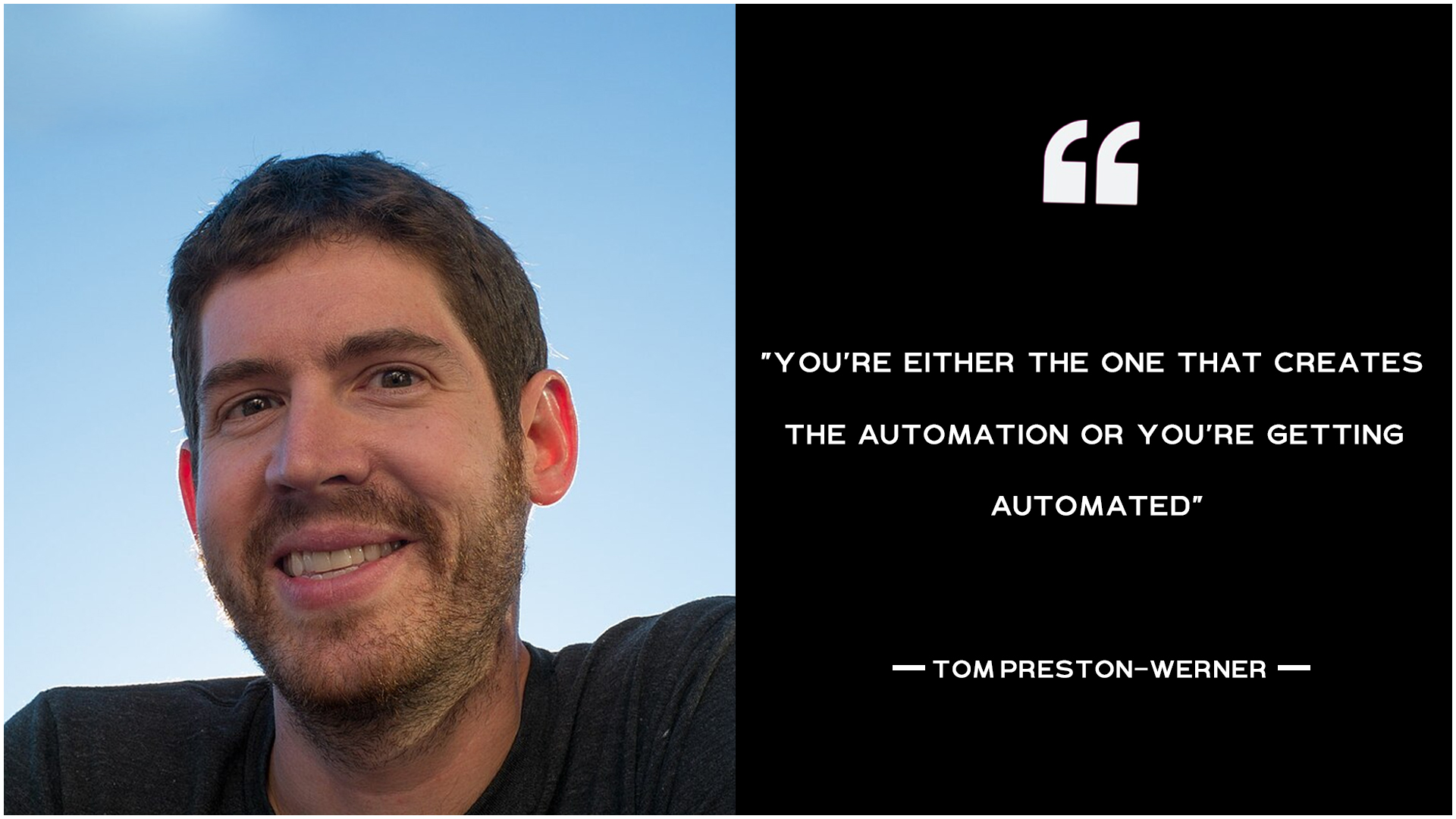Table of Contents
Introduction
Marketing Technology—commonly referred to as MarTech—has transformed the way businesses attract, engage, and retain customers. With the right tools in place, organizations can automate workflows, personalize messaging, and track performance with precision.
MarTech is important for marketers and business leaders as it supports end-to-end execution. It enables scalable strategies and strengthens both B2B and B2C relationships for better customer connections.
This guide explores the full scope of MarTech, its benefits, platform categories, leading tools in each space, and how to choose the right stack to align with your business objectives in 2025 and beyond.
Key Statistics
- There are upwards of 9500 martech tools available worldwide
- A survey showed that 100% of teams in which marketing and sales work together do so through martech
- Email marketing is the most automated marketing channel, with 65% of marketers saying they automate their email marketing efforts
- About 70% of sales-as-a-service (SaaS) and technology companies use integrated martech tools
- 68% of CMOs agree that martech is critical for meeting customer expectations
What is Marketing Technology - MarTech?
Marketing Technology, or MarTech, refers to a broad set of digital tools and software used by businesses to execute, analyze, and optimize marketing initiatives. These platforms are designed to enhance marketing productivity, improve targeting accuracy, and deliver personalized experiences at scale.
Core Functions of MarTech
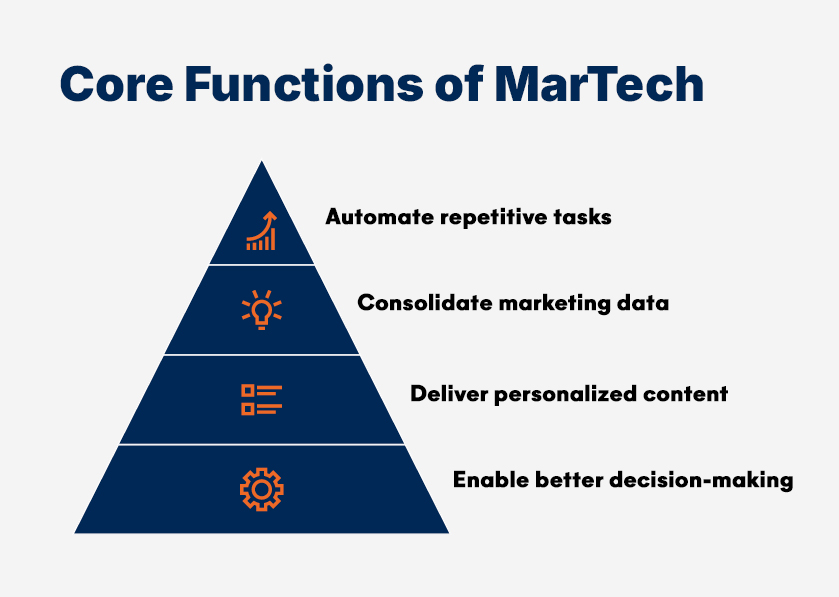
- Automate repetitive tasks such as email sends, social posts, and lead-nurturing sequences.
- Consolidate marketing data across platforms for centralized analysis.
- Deliver personalized content and ads to segmented audiences across channels.
- Enable better decision-making using real-time data and reporting tools.
In essence, MarTech platforms empower businesses to do more with less while staying agile and competitive in a constantly shifting digital environment.
Key Benefits of Using MarTech Platforms
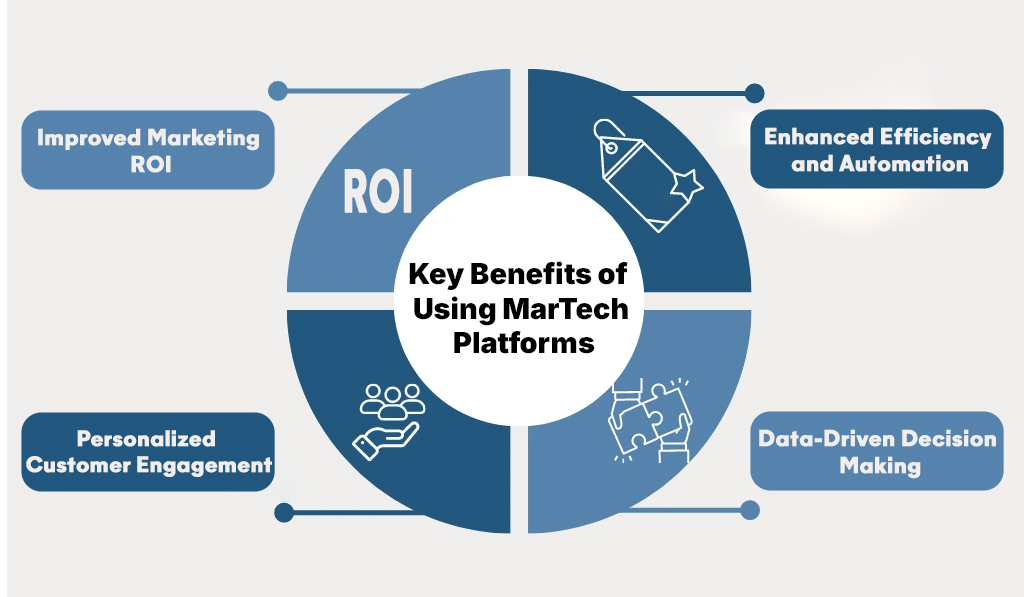
- Enhanced Efficiency and Automation: Marketing automation reduces manual effort, freeing teams to focus on strategy and creative initiatives.
- Data-Driven Decision Making: MarTech platforms consolidate data from multiple sources to provide actionable insights for better targeting and forecasting.
- Personalized Customer Engagement: Tools like CRM and AI-powered segmentation help deliver hyper-personalized experiences that increase loyalty and conversion rates.
- Improved Marketing ROI: By connecting marketing spend directly to measurable outcomes, MarTech platforms help executives allocate budgets more effectively.
Top MarTech Platform Categories and Leaders
The MarTech landscape is vast, with thousands of tools. Here are the core categories and top platforms that business executives should know:
Customer Relationship Management (CRM)
CRM platforms are the cornerstone of personalized marketing, sales alignment, and customer lifecycle management.
Top CRM Platforms:
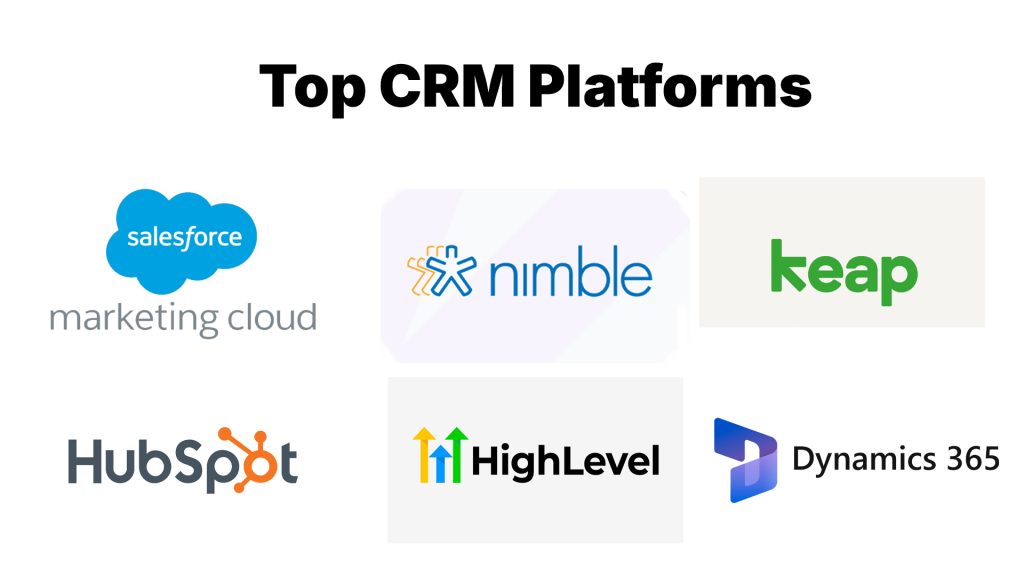
- Salesforce Marketing Cloud: A robust, enterprise-grade platform offering a unified view of customers across marketing, sales, and service. Ideal for large-scale campaigns and omnichannel automation.
- HubSpot: Known for its intuitive interface and strong inbound marketing tools, HubSpot provides seamless integration between CRM, email marketing, landing pages, and automation.
- Go High Level: A powerful all-in-one platform tailored for agencies and small businesses. It includes CRM, SMS marketing, sales funnels, and automation tools in one dashboard.
- Microsoft Dynamics 365: A scalable enterprise CRM solution that integrates deeply with other Microsoft products, offering powerful reporting, customer insights, and workflow automation.
- Nimble: A simple and social CRM tool designed for small to mid-sized businesses. It emphasizes relationship-building by aggregating contacts from email, social media, and calendars.
- Keap (formerly Infusionsoft): A CRM and marketing automation platform built for small businesses. It excels in lead capture, sales pipeline management, and automated follow-up campaigns.
Marketing Automation
Marketing automation platforms streamline complex workflows, manage multi-channel campaigns, and ensure that the right messages reach the right audience at the right time.
Top Marketing Automation Platforms:
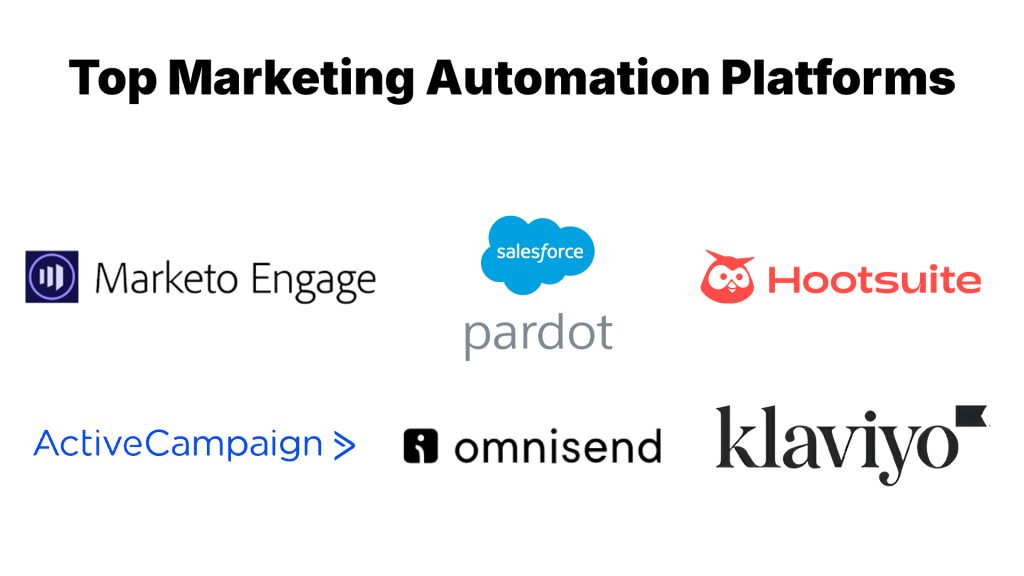
- Marketo Engage (Adobe): A leading solution for B2B enterprises, offering scalable automation, lead scoring, and advanced reporting features tailored for complex buyer journeys.
- Klaviyo: Designed for e-commerce brands, Klaviyo uses real-time data to trigger highly personalized email and SMS campaigns, boosting retention and repeat purchases.
- ActiveCampaign: Combines email marketing, CRM, and powerful automation into one platform. Great for small to mid-sized businesses seeking flexibility and scalability.
- Omnisend: A robust automation tool for e-commerce with pre-built workflows, drag-and-drop editors, and strong integration with Shopify and other platforms.
- Pardot (Salesforce): Built for B2B marketers, Pardot supports advanced lead nurturing, ROI tracking, and seamless integration with Salesforce CRM.
- Hootsuite: Though traditionally known for social media management, Hootsuite includes automation features for publishing, engagement, and audience targeting across platforms.
Analytics and Business Intelligence (BI)
Analytics and BI platforms help organizations unlock insights from raw marketing data, enabling smarter decisions, better forecasting, and deeper understanding of customer behavior.
Top Analytics and BI Platforms:

- Google Analytics 4 (GA4): A modern web analytics platform that focuses on event-based tracking, cross-device measurement, and deeper customer journey insights.
- Tableau (Salesforce): An enterprise-ready data visualization platform offering customizable dashboards and interactive reports for marketing, sales, and executive teams.
- Looker (Google Cloud): A powerful BI solution that enables real-time exploration and reporting using a semantic modeling layer, perfect for large-scale analytics environments.
- Power BI (Microsoft): Offers seamless integration with Microsoft tools and services, making it ideal for companies in the Microsoft ecosystem looking for customizable, scalable BI.
- Domo: A cloud-native BI platform that connects with hundreds of data sources, offering executive-friendly dashboards and alerts for real-time decision-making.
- Qlik Sense: Known for its associative data model and self-service analytics capabilities, Qlik Sense enables users to discover hidden trends and correlations across datasets.
Content Management Systems (CMS) & Experience Platforms (CXP)
CMS and Experience Platforms are essential for managing digital content and delivering personalized, seamless customer experiences across websites, mobile apps, and other digital channels.
Top CMS/CXP Platforms:
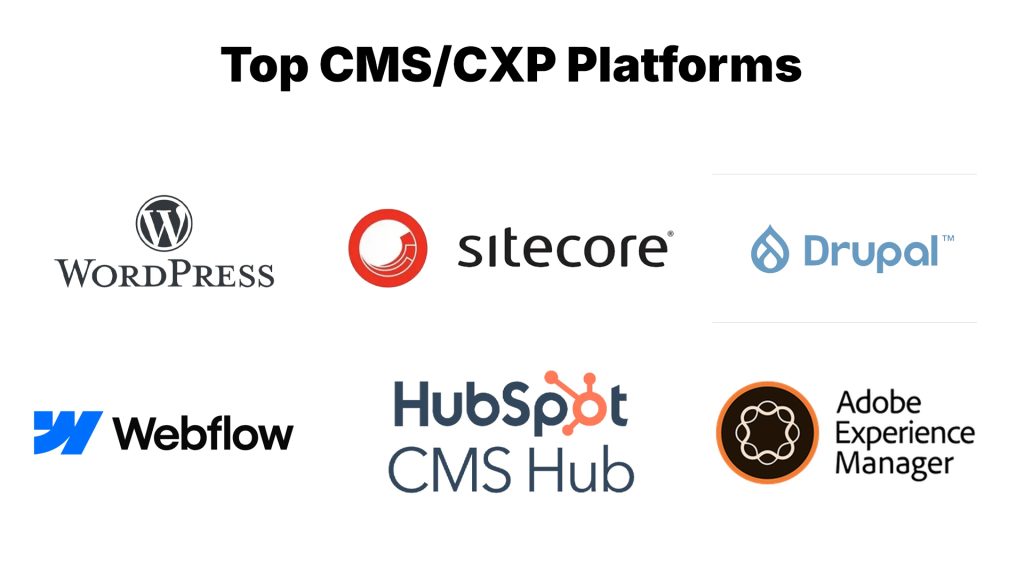
- WordPress: The most widely adopted open-source CMS, known for its flexibility, ease of use, and vast ecosystem of plugins and themes that suit businesses of all sizes.
- Adobe Experience Manager (AEM): An enterprise-grade content and experience management solution, AEM offers advanced personalization, asset management, and omnichannel delivery.
- Sitecore: Combines powerful CMS capabilities with marketing automation, AI-driven personalization, and headless content delivery across digital channels.
- Drupal: A secure and highly customizable open-source platform, ideal for organizations with complex content workflows, multilingual needs, or enterprise-level requirements.
- Webflow: A modern visual web design and CMS platform tailored for marketers and designers to create high-performance, responsive websites without coding.
- HubSpot CMS Hub: Part of the HubSpot ecosystem, this CMS offers a seamless connection between content, CRM, and marketing automation for highly personalized, data-driven experiences.
Advertising and Social Media Management
These platforms help businesses plan, execute, and measure paid media campaigns while managing organic social content. From audience targeting and real-time bidding to analytics and engagement tracking, they provide end-to-end campaign control across channels.
Top Advertising and Social Media Management Platforms:
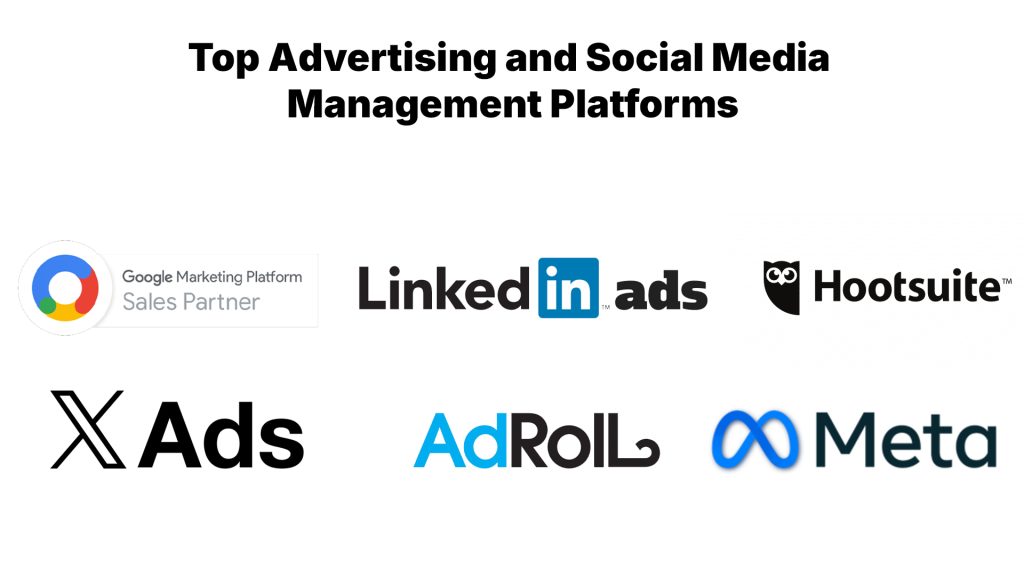
- Google Marketing Platform: An integrated suite that includes Google Ads, Display & Video 360, and Analytics 360—ideal for managing large-scale advertising campaigns and tracking ROI.
- Hootsuite: A leading social media management tool that enables scheduling, publishing, monitoring, and reporting across multiple networks from one dashboard.
- Meta Ads Manager: Facebook and Instagram’s centralized advertising platform, offering granular targeting, performance insights, and optimization tools for B2C and B2B campaigns.
- LinkedIn Campaign Manager: Designed for B2B marketers, this platform enables precise targeting by industry, job title, company size, and more—perfect for lead generation and brand awareness.
- Twitter/X Ads: Provides advertisers with tools for promoted tweets, trends, and accounts, along with real-time targeting options based on interests, behaviors, and events.
- AdRoll: A multi-channel retargeting and performance marketing platform that uses AI to serve dynamic ads across web, social, and email to boost conversion rates.
Customer Data Platforms (CDP)
Customer Data Platforms unify first-party customer data from multiple sources into centralized, persistent profiles.
Top Customer Data Platforms:
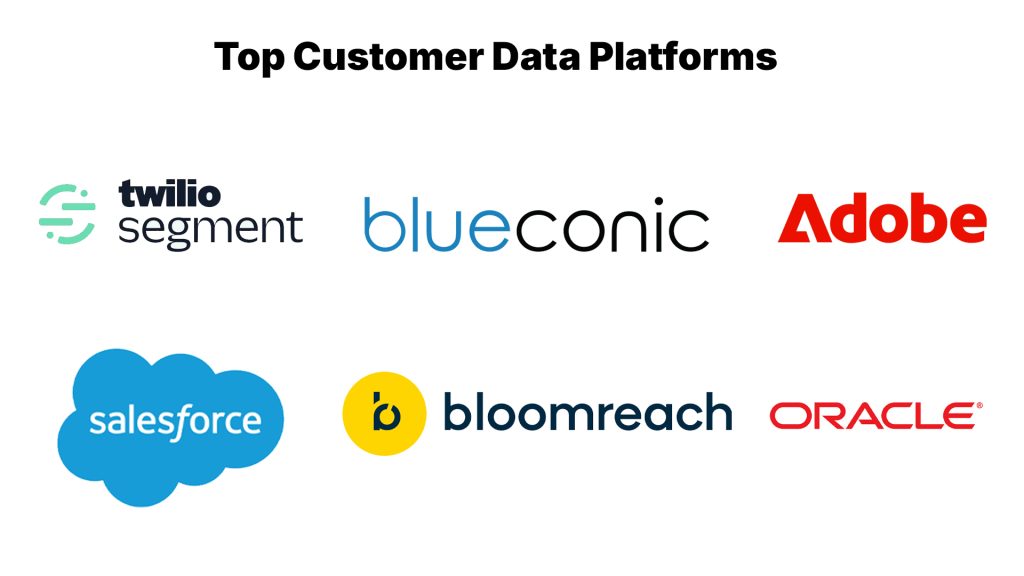
- Segment (Twilio): A developer-friendly CDP that collects, cleans, and routes customer data to over 300 tools, enabling advanced personalization and analytics across your MarTech stack.
- BlueConic: Specializes in real-time profile unification and activation, helping marketers deliver personalized experiences across web, mobile, email, and other touchpoints.
- Salesforce Data Cloud: Formerly known as Customer 360 Audiences, this enterprise-grade CDP integrates with the full Salesforce ecosystem to build unified customer views and enable cross-channel personalization.
- Bloomreach Engagement: A powerful CDP combined with AI-driven marketing automation, it offers unified customer data, product discovery, and personalized messaging for e-commerce and B2C brands.
- Adobe Real-Time CDP: Part of Adobe Experience Cloud, this platform provides B2B and B2C businesses with real-time unified profiles and AI-driven segmentation to deliver context-aware experiences.
- Oracle CX Unity: An enterprise CDP that connects data from Oracle and third-party systems, enabling marketers to orchestrate personalized, real-time interactions across customer journeys.
How to Choose the Right MarTech Stack
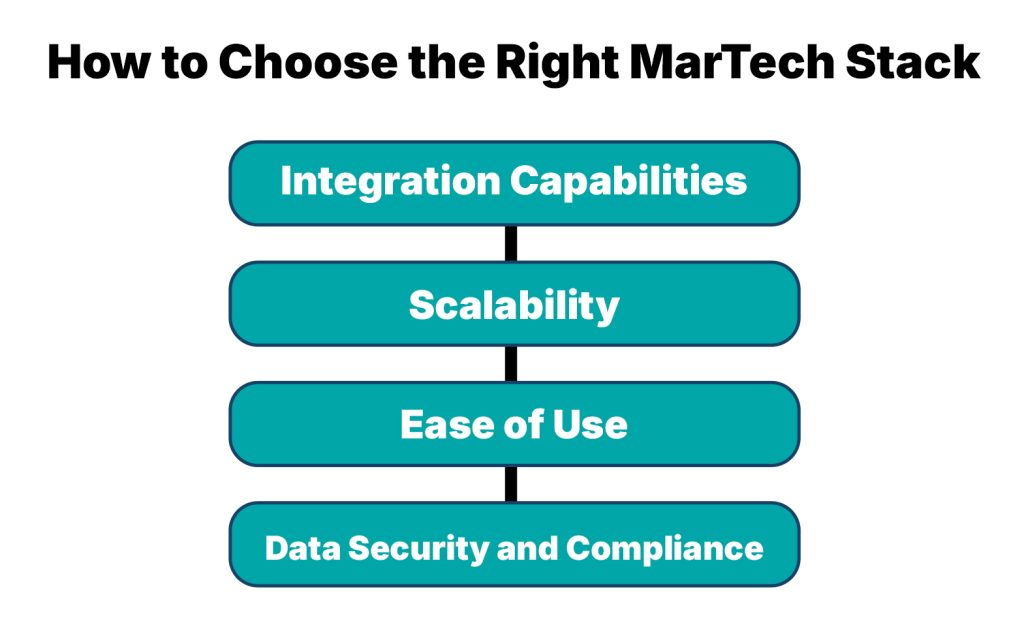
Executives should prioritize platforms that align with their company’s strategic goals, industry, and resources. Key considerations include:
- Integration Capabilities: Ensure the platform works seamlessly with your existing systems.
- Scalability: Choose tools that can grow with your business and evolving marketing needs.
- Ease of Use: Select solutions that empower your marketing team without excessive IT dependency.
- Data Security and Compliance: Verify that platforms meet privacy regulations like GDPR and CCPA.
The Future of MarTech
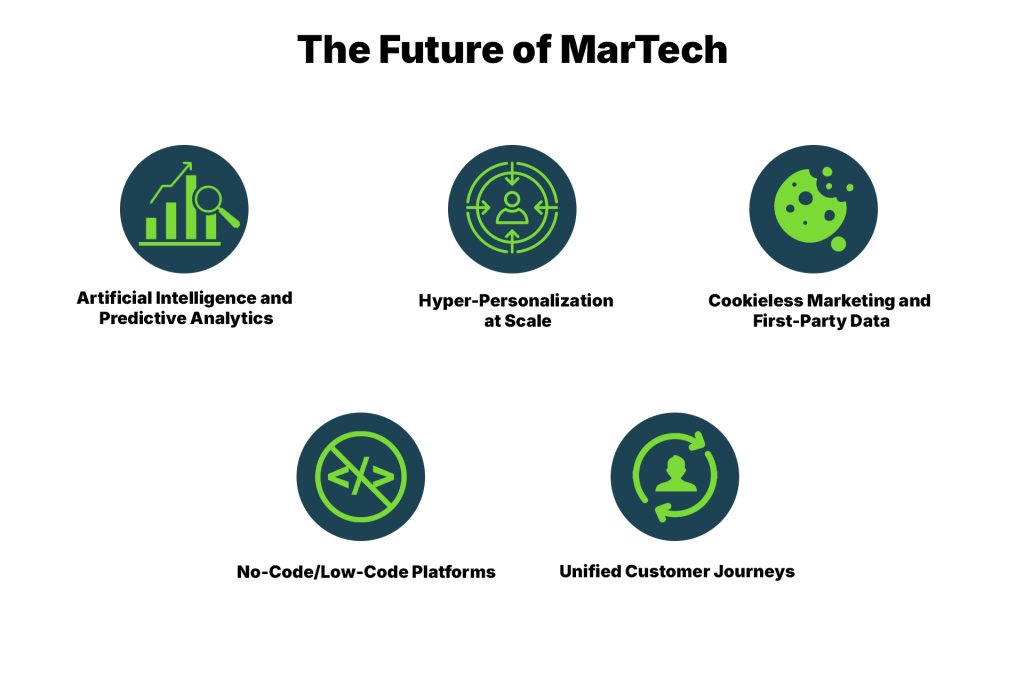
The MarTech landscape is evolving at breakneck speed. Executives need to stay ahead of key trends that will define the next generation of marketing.
- Artificial Intelligence and Predictive Analytics: AI will continue transforming how marketers predict user behavior, create dynamic content, and optimize spend.
- Hyper-Personalization at Scale: Beyond just using a customer’s first name, platforms will leverage browsing behavior, purchase history, and contextual data to craft real-time, relevant experiences.
- Cookieless Marketing and First-Party Data: As third-party cookies phase out, companies will lean more heavily on CDPs and first-party data strategies to maintain targeting accuracy and compliance.
- No-Code/Low-Code Platforms: Democratizing marketing tech development, no-code tools will allow non-technical users to build automations, integrations, and workflows without writing code.
- Unified Customer Journeys: Customers expect a consistent experience across email, social, web, and offline. MarTech platforms are evolving to support seamless omnichannel journeys.
Conclusion
Marketing technology isn’t just about adopting tools—it’s about building a strategic ecosystem that aligns with business objectives and drives performance. For executives, investing in the right MarTech stack can mean the difference between stagnation and scalable growth.
Whether you’re building awareness, acquiring leads, or nurturing customer loyalty, the right blend of platforms will empower your team to act with precision and agility. Embrace the evolution of marketing and position your organization to succeed in a digital-first future.
Deepak Wadhwani has over 20 years experience in software/wireless technologies. He has worked with Fortune 500 companies including Intuit, ESRI, Qualcomm, Sprint, Verizon, Vodafone, Nortel, Microsoft and Oracle in over 60 countries. Deepak has worked on Internet marketing projects in San Diego, Los Angeles, Orange Country, Denver, Nashville, Kansas City, New York, San Francisco and Huntsville. Deepak has been a founder of technology Startups for one of the first Cityguides, yellow pages online and web based enterprise solutions. He is an internet marketing and technology expert & co-founder for a San Diego Internet marketing company.

